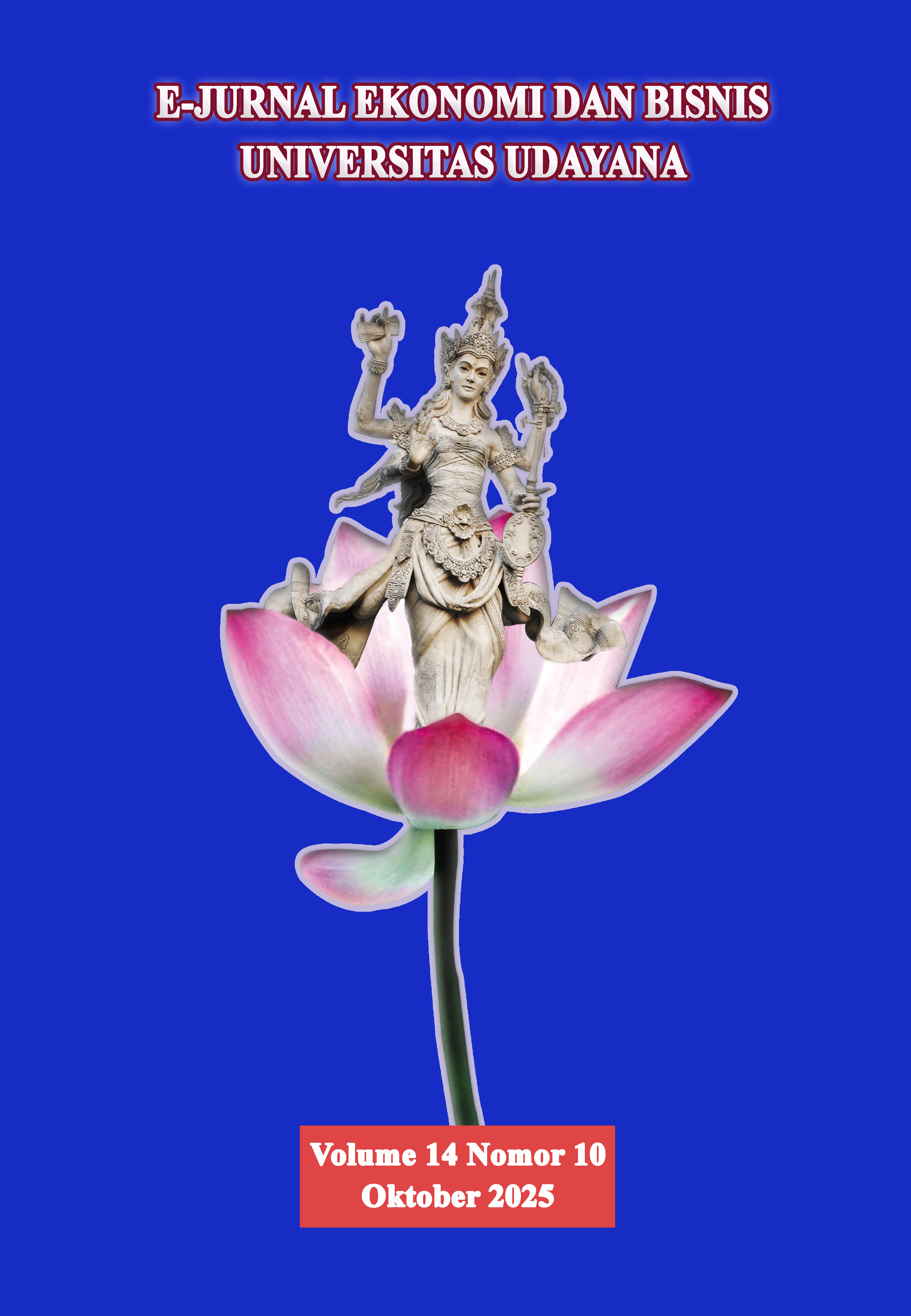PENGARUH SEKTOR BASIS NON PARIWISATA, PENDIDIKAN DAN UMK TERHADAP PENYERAPAN TENAGA KERJA DI PROVINSI BALI
DOI:
https://doi.org/10.24843/EEB.2025.v14.i10.p07Keywords:
City Maximum Wage, Education, Labor Absorption, Non-Tourism Base Sector, Pendidikan, Penyerapan Tenaga Kerja, Sektor Basis Non Pariwisata, Upah Minimum, Kabupaten/KotaAbstract
Diversifikasi ekonomi semakin penting dalam memastikan stabilitas regional, terutama di daerah yang sangat bergantung pada satu sektor ekonomi saja. Penelitian ini menggunakan metode kuantitatif dengan teknik analisis data panel dan pendekatan Dynamic Location Quotient (DLQ) untuk mengidentifikasi sektor basis nonpariwisata di sembilan kabupaten/kota di Provinsi Bali selama periode 2015-2024. Hasil analisis menunjukkan bahwa terdapat empat sektor basis nonpariwisata yaitu sektor pertanian, perikanan, dan kehutanan; sektor industri pengolahan; sektor transportasi dan pergudangan; sektor informasi dan komunikasi. Secara simultan sektor pertanian, perikanan, dan kehutanan; sektor industri pengolahan; sektor transportasi dan pergudangan; sektor informasi dan komunikasi, pendidikan, dan UMK berpengaruh positif dan signifikan terhadap penyerapan tenaga kerja di Provinsi Bali Tahun 2015-2024. Secara parsial sektor pertanian, perikanan, dan kehutanan (X1_1); sektor industri pengolahan (X1_2) berpengaruh positif dan signifikan terhadap penyerapan tenaga kerja, variabel sektor informasi dan komunikasi (X1_4), pendidikan (X2) berpengaruh negatif dan signifikan terhadap penyerapan tenaga kerja di Provinsi Bali, dan sektor transportasi dan pergudangan (X1_3), UMK (X3) berpengaruh positif dan tidak signfikan terhadap penyerapan tenaga kerja di Provinsi Bali.
Economic diversification is becoming increasingly important in ensuring regional stability, especially in areas that are highly dependent on a single economic sector. This study employs a quantitative method using panel data analysis techniques and the Dynamic Location Quotient (DLQ) approach to identify nontourism base sectors in the nine regencies/cities of Bali Province during the 2015–2024 period. The analysis results indicate that there are four (4) nontourism base sectors: the agriculture, forestry, and fisheries sector; the manufacturing sector; the transportation and warehousing sector; and the information and communication sector. Simultaneously, the agriculture, forestry, and fisheries sector; the manufacturing sector; the transportation and warehousing sector; the information and communication sector; education; and the minimum wage (UMK) have a positive and significant effect on employment absorption in Bali Province during 2015–2024. Partially, the agriculture, forestry, and fisheries sector (X1_1) and the manufacturing sector (X1_2) have a positive and significant effect on employment absorption. Meanwhile, the information and communication sector (X1_4) and education (X2) have a negative and significant effect on employment absorption in Bali Province. The transportation and warehousing sector (X1_3) and the minimum wage (X3) have a positive but not significant effect on employment absorption in Bali Province.
Downloads
Published
Issue
Section
License
Copyright (c) 2025 Seli Indah Dela Puspitasari, I Wayan Priyana Agus Sudharma (Author)

This work is licensed under a Creative Commons Attribution 4.0 International License.














